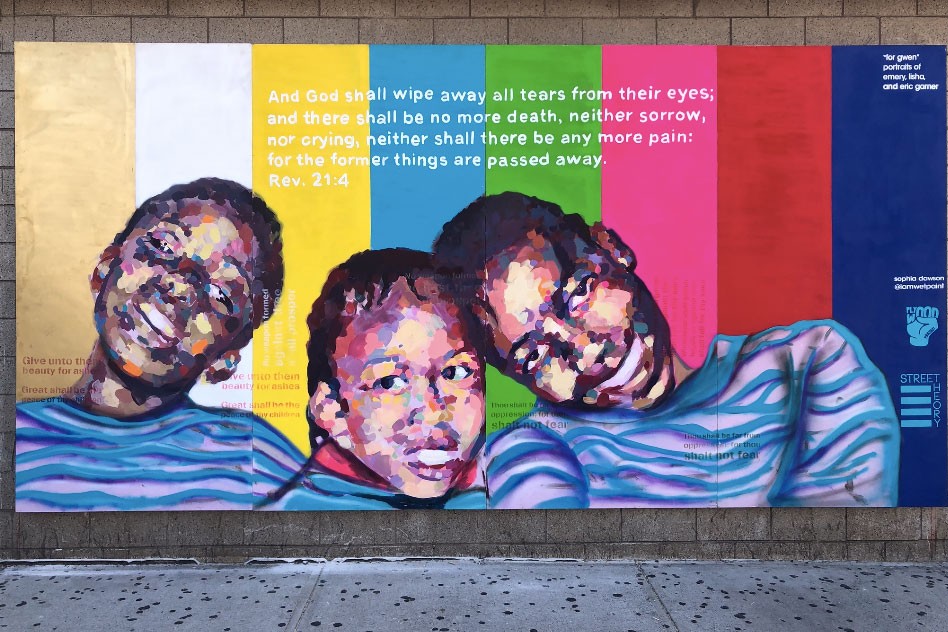News + Blog
ARS x Plywood Project
Artists Rights Society (ARS) is proud to announce that it has become the artist rights partner of the Plywood Project —a new public art initiative, inspired by recently boarded storefronts, to transform and empower communities with art.
As such, ARS will be responsible for licensing works in the Plywood Project’s collection, and advocate for participating artists to ensure they receive due credit and income from their creations.
The Plywood Project will commission new works by artists from historically marginalized groups for New York’s storefronts, but equally important will be its creation of a living database of all protest and street art from the movement that swept New York City in the wake of George’s Floyd’s death. This database—built in consultation with ARS—will be open-source and collaborative: anyone will be able to add to it and help in its attribution.
The Plywood Project will make its formal debut on July 20th, with the unveiling of a newly commissioned painting by Brooklyn-based artist Sophia Dawson at the Modell’s Sporting Goods store located across the street from Barclay’s Center, which was transformed into a spontaneous town square as its plaza became a nexus for demonstrations against police brutality and racial injustice. Dawson was recently chosen by New York City’s Department of Cultural Affairs as one of the artists to create the newly minted “Black Lives Matter” on the streets of Foley Square.
Alongside Sophia’s painting, the Plywood Project Modell’s installation will also feature wheat pasted posters by MacArthur Award-winning artist Carrie Mae Weems, as part of her Resist Covid Take 6 PSA campaign, in support of communities most impacted by COVID-19.
By collaborating with cultural nonprofits, business partnerships, and city government, and with the help of ARS, the Plywood Project will preserve history through artworks by Black and Brown artists on the ground, and will commission new art (made in conjunction with mentored youth) throughout the city and metropolitan area. Other participating artists and institutions will include Sugar Hill Children’s Museum of Art & Storytelling and the Andrew Freedman Home, among others. As newly-inducted members of ARS, participating artists will be entitled to intellectual property rights management and active monitoring for unauthorized reproductions by ARS on their behalf.
Additionally, ARS will compile a “know your rights” legal primer on the tricky world of copyrighting, reproducing and making street art, which will be tailored to the needs of Plywood Project artists, and made available as a public resource.
The Plywood Project models collaboration in its decentralized leadership, currently organized with founding partners Eve Moros Ortega of Lord Cultural Resources, Manon Slome of No Longer Empty, the Brooklyn Arts Council, New Yorkers for Culture and Arts, Groundswell, The Office Performing Arts + Film, Downtown Brooklyn Partnership, and Living Trust for the Arts. The Plywood Project is growing its consortium of partners to include the Human Impacts Institute, Global Action Project, Drim Films, Sugar Hill Children’s Museum of Art + Storytelling, and others.

ABOUT ARTISTS RIGHTS SOCIETY
Artists Rights Society (ARS) is the preeminent copyright, licensing, and monitoring organization for visual artists in the United States. Founded in 1987, ARS represents the intellectual property rights interests of over 122,000 visual artists and their estates from around the world. Using the power and prestige of their experience and global network, ARS works as the official agent for member artists in order to create exciting new projects and collaborations ARS not only represents artists in matters related to intellectual property, but also works tirelessly to ensure that artists are protected and remunerated for their work. The organization continually lobbies state and federal legislatures for stronger and more effective artists’ rights laws.
The Plywood Project is an innovative consortium launched by New York City partners – including non-profit art organizations, private businesses, the borough arts councils, and New York’s many creative workers – to empower artists and communities of color most affected by our triple crises we now face: Covid-19, economic downtown, and racial injustice. The Plywood Project models collaboration, public-private partnership, and concrete action to advance diversity, equity, and inclusion – and creates opportunities for long-term positive impact by generating beauty, dialogue, and income streams resulting from the Plywood Project artworks. Placing art, creativity, and collaboration at the center of today’s civic discourse, the Plywood Project asks all of us to transform this moment into an opportunity to offer cultural justice as part of the larger movement towards social justice.



